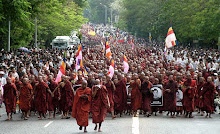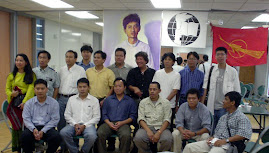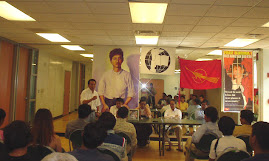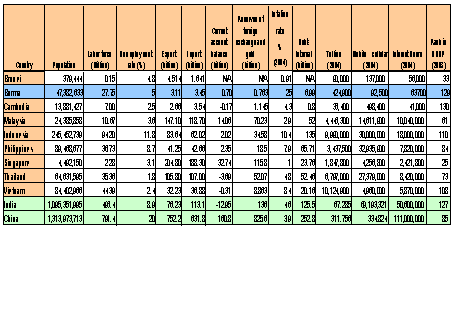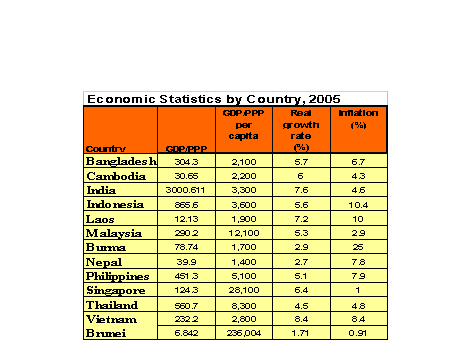ဆင္းရဲမြဲေတေနတဲ့ၿမန္မာႏုိင္ငံဟာ စစ္အုပ္စုရဲ႕ အုပ္ခ်ဴပ္မႈေအာက္မွာ လူဦးေရ ၆ သန္းေက်ာ္ဟာ အစားအစာၿပတ္လတ္မႈနဲ႔ ရင္ဆုိင္ေနၾကရပါတယ္လုိ႔ ကမၻာ့ကုလသမဂၢ လယ္ယာစုိက္ပ်ိဳးေရးႏွင့္စားနပ္ရိကၡာအဖြဲ႔ ( FAO) က မေန႔ကထုတ္ေဖာ္ ေၿပာဆုိသြားပါတယ္။ အမ်ားစုဟာ ဆုိင္ကလုံနားဂစ္ဒဏ္ခံခဲ့ရတဲ့ၿမစ္၀ကြ်န္းေပၚေဒသေတြမွာၿဖစ္ၿပီး၊ ခ်င္းၿပည္နယ္ႏွင့္ ရခုိင္ၿပည္နယ္ေတြမွာလည္း အစားေရစာၿပတ္လတ္မႈေတြနဲ႔ ၾကံဳေတြ႔ေနရတယ္လုိ႔ေၿပာဆုိသြားပါတယ္။ ဒီႏွစ္အတြက္ ဆုိင္ကလုံ နားဂစ္ဒဏ္ခံခဲ့ရတဲ့ ၿမစ္၀ကြ်န္းေပၚေဒသေတြမွာ အေရးေပၚစားနပ္ရိကၡာ တန္ခ်ိန္ ၈၅,၀၀၀ လုိအပ္ေနၿပီး၊ တၿခားေဒသေတြ အတြက္ အေရးေပၚစားနပ္ရိကၡာ တန္ခ်ိန္ ၁၀၀,၀၀၀ လုိအပ္ေနပါတယ္လုိ႔ အတည္ၿပဳေၿပာၾကားခဲ့ပါတယ္။ ဆုိင္ကလုံနားဂစ္ ဒဏ္ခံခဲ့ရတဲ့ၿမစ္၀ကြ်န္းေပၚေဒသေတြမွာ လယ္ယာေၿမေတြပ်က္စီးေနမႈ၊ ဓာတ္ေၿမၾသဇာရွားပါးမႈ၊ ႏွင့္ ရာသီဥတုဆုိး၀ါးေနမႈေၾကာင့္ စုိက္ပ်ိဳးထုတ္လုပ္မႈ သိသိသာသာက်ဆင္းေနတယ္လုိ႔ေဖာ္ၿပပါရွိပါတယ္။ လယ္ေၿမဧက ၂ သန္း ( ၈၀၀,၀၀၀ ဟတ္တာဧက ) ပ်က္စီးခဲ့တာေၾကာင့္ ၈၅ ရာခုိင္ႏွဳန္း စားနပ္ရိကၡာစုေဆာင္းထားမႈ ပ်က္စီးခဲ့ရတယ္လုိ႔ ကုလသမဂၢ ၏ စီးပြားေရးပညာရွင္ Cheng Feng ႏွင့္ ၿမန္မာႏုိင္ငံဆုိင္ရာ ကမၻာ့စားနပ္ရိကၡာ ကုိယ္စလွယ္အၾကီးအကဲ Chris Kaye က အတည္ၿပဳ ထုတ္ေဖာ္ေၿပာဆုိခဲ့ပါတယ္။ ၂၀၀၈ ခုႏွစ္ လယ္ယာစုိက္ပ်ိဳးထုတ္လုပ္မႈ ၃၂.၅ ရာခုိင္ႏွဳန္း က်ဆင္းသြားတာေၾကာင့္ စားနပ္ရိကၡာ တန္ခ်ိန္ ၁.၉၃ သန္း သာ ဒီႏွစ္ေစာေစာပုိင္းမွာ ထုတ္လုပ္ႏုိင္ခဲ့တယ္။ အၿခားအေၾကာင္းကေတာ့ ေစ်းကြက္မွာ ဆန္ေစ်းႏွဳန္းက်ဆင္းမႈ ႏွင့္ ေၿမၾသဇာ ေစ်းႏွဳန္းၿမင့္မားလာမႈ၊ ေၾကာင့္ လယ္သမားေတြကုိ ဆန္စပါးစုိက္ပ်ိဳးလာေအာင္ မဆြဲေဆာင္ႏုိင္ခဲ့ဘူးလုိ႔ အစီရင္ခံစာထဲမွာေဖာ္ၿပထားပါတယ္။
တခ်ိဳ႕ ေဒသေတြမွာ ဆုိင္ကလုံနားဂစ္ဒဏ္ခံခဲ့ရတာေၾကာင့္ မ်ိဳးေစ့ေတြဟာ အၾကိမ္ၾကိမ္စုိက္ပ်ိဳးခဲ့ၾကေသာ္လည္း မေအာင္မၿမင္ၿဖစ္ခဲ့ရတယ္လုိ႔ ကမၻာ့စားနပ္ရိကၡာ အဖြဲ႔ မွ စီးပြားေရးပညာရွင္ Cheng Feng က အစီရင္ခံစာထဲမွာ ပါရွိတဲ့အတုိင္း ထုတ္ေဖာ္ေၿပာဆုိသြားပါတယ္။
Rest of your post
Thursday, January 29, 2009
Myanmar's food crisis
Refugee problem needs joint action by governments

Bunn Nagara
The Star
A complex, dual injustice against the Rohingya people of Burma ( Myanmar) now threatens to become a more complicated problem for governments in this region.
Even as a large, 40 per cent minority in Rakhine (the former Arakan) state in western Burma, the Rohingyas are denied recognition as a community by Burma’s military junta. And so persecution of the Rohingyas became common, forcing them to move abroad.
Rohingyas are scattered over Bangladesh, Malaysia, Pakistan, Saudi Arabia, Thailand and the UAE. Refugee flows of the Muslim Rohingyas to Malaysia have risen since 2006, naturally attracted to a relatively close, prosperous and Muslim-majority Malaysia.
For years, Thai authorities had been lax about flows into Thailand, thinking that these Rohingyas were only “passing through” into Malaysia. But the former government of prime minister Samak Sundaravej tightened controls, and boatloads of refugees have since reportedly been towed into sea.
Braving such journeys may seem unnecessarily risky even for refugees, but the Rohingyas’ experience at home could have been worse. According to Amnesty International (AI), in Burma they suffered extortion, arbitrary taxation, land confiscation, eviction, property destruction, denial of citizenship and forced labour.
Lately, the Thai army has been accused of brutalising and even shooting some Rohingyas and leaving the rest to drift or die at sea. There are some quarters in the Thai military who even believe the Rohingyas had arrived to fight alongside separatist Muslim rebels in the country’s southern provinces.
When Rohingyas seeking to enter Malaysia through Thailand head for the south, they immediately become suspect. Their Muslim identity further inflames suspicions, particularly when they are able-bodied men who might have arrived only seeking work.
In recent days there have been reports of an illegal labour syndicate trading in migrant workers from Burma. This human trafficking is said to involve some uniformed Thai and Malaysian officials.
And since these “workers” are illegal, coming with hopes of a better life in a foreign land, they would want to settle in the country upon arrival.
Rohingyas resemble South Asians, speaking a language similar to Bengali, and a known number of 20,000 are already in Malaysia.
Those who had settled in Bangladesh enjoy linguistic similarities with Bangladeshi culture.
However, these stateless refugees reportedly receive no assistance from the Bangladesh government.
Last week, official reports on hundreds of refugees who recently suffered alleged abuse from Thai authorities said most of them were actually Bangladeshis. The reports also said the most popular economic destination was Malaysia.
Five days ago Thailand proposed hosting a regional conference to resolve the issue. Thai authorities have come under the international spotlight for alleged mistreatment of Rohingyas, and the new government in Bangkok wants to dispel any such misgivings.
Meanwhile, the UN High Commissioner for Refugees is investigating allegations by groups like AI.
Thailand says it wants to resolve the issue properly, while noting that the country has been a target of various economic refugees such as the Hmong people from Laos.
Thailand’s experience in handling refugees can be helpful. It had worked successfully with South Korea in relocating people fleeing North Korea, in the process showing that inter-governmental action is essential.
The Rohingya question should therefore be an important item at the Asean summit in Hua Hin, Thailand next month. The issue requires a speedy and just resolution, in the interests of the Rohingyas and the countries of Asean.
But there is a misplaced view within Asean that Muslim-majority countries like Malaysia need to take a higher profile role on the Muslim Rohingyas.
To preserve the impartiality of the country and the integrity of the Asean process, a Muslim-majority country should instead avoid seeming to set the agenda.
Asean can be entrusted with finding an agreeable formula for the Rohingyas’ resettlement through consensus. The issue is in essence political, not racial or religious.
Ultimately, the Rohingya problem lies squarely with Burma. This and other refugee problems, and all associated hardships, are likely to continue, grow and spill overseas so long as there is a wilful and wanton denial of good governance at home.
Rest of your post
Wednesday, January 28, 2009
Ice storm cuts electricity to more than 1 million
Visit msnbc.com for Breaking News, World News, and News about the Economy
ၿမတ္စုိး-
အေမရိကန္ အေ႕ရွပုိင္းကမ္းရုိးတန္း ၿပည္နယ္ေတြမွာ မေန႔ က ေရခဲ ႏွင့္ ႏွင္းမုန္တုိင္း တုိက္ခုိက္္မႈ ေၾကာင့္ ေနရာေတာ္ေတာ္မ်ားမ်ားမွာ လွ်ပ္စစ္မီးလုိင္းေတြ ၿပတ္ေတာက္ခဲ့ ရပါသည္။ ႏွင္းမုန္တုိင္းဟာ တန္နက္စ္ဆီ ၿပည္နယ္ ( Tennessee) မွ နယူးအဂၤလန္ (New England) အထိ က်ေရာက္ခဲ့တာပါ။ ႏွင္းမုန္တုိင္း ရာသီဥတုဆုိး ေၾကာင့္ ၿပင္းထန္ေသာ ယာဥ္တုိက္မႈေတြ ေနရာေတာ္ေတာ္မ်ားမ်ား မွာ ၿဖစ္ပြားခဲ့ၾကသည္။ လူအေသ အေပ်ာက္မ်ား လည္းရွိတယ္။ တခ်ိဳ႕ေနရာေတြ မွာ သစ္ပင္မ်ားၿပိဳလဲက်ၿပီး၊ လမ္းမ်ား ပိတ္ဆုိ႔ ခဲ့ရပါသည္။ တခ်ဳိ႕ ၿပည္နယ္ေတြရွိ ေနရာေတာေတာမ်ားမ်ားမွာသစ္ပင္မ်ားၿပိဳလဲ၍ လွ်စ္စစ္မီးၾကိဳးမ်ား ၿပတ္ေတာက္ကာ အိမ္တခ်ဳိ႕ မီးေလာင္ခဲ့ရတယ္။ အခုဆုိ အိမ္ေၿခ တသန္းေက်ာ္ ( a million customers) လွ်ပ္စစ္မီးၿပတ္ေတာက္ေနၿပီး၊ စုစုေပါင္း လူေပါင္း ၂၃ ေယာက္ ေသဆုံးခဲ့တယ္လုိ႔ သတင္းထဲမွာ ေဖာ္ၿပ ထားပါတယ္။ တနလၤာေန႔ ႏွင္းမုန္တုိင္းစတင္က်ၿပီးကတည္းက တကၠဆတ္ (Texas) ၿပည္နယ္ ႏွင့္ မီစုိရီ (Missouri) ၿပည္နယ္ မွာ ၆ ေယာက္၊ အာကမ္းစပ္စ္ (Arkansas) ၿပည္နယ္မွာ ၄ ေယာက္၊ ဗာဂ်ီးနီးယား (Virginia) ၿပည္နယ္မွာ ၃ ေယာက္၊ အုိကလာဟုိးမား (Oklahoma) မွာ ၂ ေယာက္ ႏွင့္ အင္ဒီယားနား (Indiana) ႏွင့္ အုိဟုိင္းရုိး(Ohio) ၿပည္နယ္ေတြမွာ ၁ ေယာက္ ေသဆုံး ခဲ့ၾကတယ္လုိ႔သိရပါတယ္။ ႏွင္းမုန္တုိင္းဟာ တကၠဆတ္ (Texas) ၿပည္နယ္နဲ႔ နယူးအဂၤလန္ကုိ ဗုဒၶဟူးေန႔မွာ ၿပင္းၿပင္းထန္ထန္ က်ေရာက္ႏုိင္တယ္လုိ႔ မုိးေလ၀သဌာနက သတိေပးထားပါတယ္။ တခ်ိဳ႕ ၿပည္နယ္ေတြမွာ စေနနဲ႔ တနဂၤေႏြထိေတာင္ လွ်ပ္စစ္မီးလာမွာ မဟုတ္ဘူးလုိ႔ ေၾကညာထား ပါသည္။ တခ်ိဳ႕ ၿပည္နယ္ေတြမွာ ေရခဲမုန္တုိင္းေတြ က်ေရာက္ေနပါသည္။ လမ္းမေပၚမွာ ေရခဲၿပင္ အၿဖစ္ဖုန္းလႊမ္းေနလွ်က္ရွိသည္။
အုိကလာဟုိမား (Oklahoma) ၿပည္နယ္မွာ လြန္ခဲ့တဲ့ ၁၃ လ တုန္းက ႏွင္းမုန္တုိင္းေၾကာင့္ လူေပါင္း ၅ သိန္း ေက်ာ္ လွ်ပ္စစ္မီးၿပတ္ေတာ့ခဲ့လုိ႔ လူေပါင္း ၃၀ ေက်ာ္ေသဆုံးခဲ့ဘူးပါတယ္။
တန္နက္စ္ဆီ ၿပည္နယ္၊ အင္ဒီယားနား၊ ေအလူးႏြိဳက္၊ ၀င္ကြန္စင္၊ အုိဟုိင္းရုိး၊ မန္ဆင္ခ်ဴးဆက္၊ နယူးဂ်ာစီ၊ ပန္ဆင္ေဗးနီးယား၊ မီခ်ီဂန္၊ ကင္တာကီ၊ အာကမ္းစပ္စ္ ႏွင့္ နယူးေယာက္ ၿပည္နယ္ေတြမွာ ႏွင္း ၄ လကၡမ ကေန ၈ လကၡမ က်ခဲ့ၿပီး ကင္တာကီ(Kentucky) မွာ လူေနအိမ္ေၿခ ၄၇၀,၀၀၀၊ အာကမ္းစပ္စ္ (Arkansas) ၿပည္နယ္မွာ ၃၀၀,၀၀၀ ေက်ာ္ လွ်ပ္စစ္းမီး ၿပတ္ေတာက္သြားတာေၾကာင့္ ၿပည္နယ္အုပ္ခ်ဳပ္ေရးမွဴးေတြက သူတုိ႔ၿပည္နယ္ေတြကုိ အေရးေပၚ အေၿခအေန ေၾကညာထား ခဲ့ရပါတယ္။
အေမရိကန္ရွိ ၿမန္မာမိသားစုမ်ားအတြက္ ႏွင္းမုန္တုိင္း အထူးသတိေပးခ်က္
* ခရီးကုိ မလုိအပ္ဘဲ မထြက္ပါႏွင့္။
* ကား ကုိ မလုိအပ္ဘဲ လမ္းမေပၚ မေမာင္းပါႏွင့္။
* ကားကုိ ေသေသခ်ာခ်ာ စစ္ေဆးၿပီးမွ ေမာင္းပါ။ (Insurance, Heater, etc)
* အေရးေပၚ ခရီးထြက္လွ်င္ သြားမည့္ ေနရာ၏ရာသီဥတုကုိၾကိဳတင္စုံစမ္းပါ။
* ဆဲဖုန္းကုိ ကုိယ္ႏွင့္တပါတည္း အၿမဲယူေဆာင္သြားပါ။
* အေတြ႔အၾကံဳမရွိေသာ ကားေမာင္းသူမ်ား ႏွင္းထူတပ္ေသာလမ္းမမ်ားတြင္ မေမာင္းသင့္ပါ။
Rest of your post
UN:Myanmar faces food crisis because of cyclone +
By MICHAEL CASEY,
AP
BANGKOK, Thailand -Myanmar faces food shortages in many parts of the country, largely because of last year's cyclone and a rat infestation that destroyed crops, according to a U.N. report released Wednesday.
About 185,000 tons of emergency food aid will be needed this year throughout the impoverished country, said the report by the United Nations Food and Agriculture Organization and the World Food Program.
Cyclone Nargis, which left more than 130,000 people dead or missing in May last year, exacerbated the country's economic difficulties and raised the prospect of a humanitarian crisis.
"Access to food remains the critical challenge for the poorest people and for vulnerable populations in remote areas of Myanmar," said Chris Kaye, WFP's representative for Myanmar. "For many of those affected by Cyclone Nargis, who are engaged in rebuilding their lives and livelihoods, the limited delta harvest means they will continue to rely on assistance to meet their food needs."
About 2 million acres (800,000 hectares) of rice paddy were submerged by massive waves and 85 percent of seed stocks was destroyed.
Cheng Feng, an economist for the FAO, told The Associated Press rice production in the delta during the second half of 2008 fell 32.5 percent to 1.93 million tons from a year earlier. A shortage of labor, higher fertilizer prices and lower rice prices may also have dissuaded some delta farmers from planting, according to the U.N. report.
"There are still problems that need to be fixed," Feng said. "The farmers said they had to plant several times because the seeds they were given were not right for that area."
Rats — which multiplied because of the rare flowering of bamboo in 2007 — have damaged 1,693 acres (685 hectares) of rice and 988 acres (400 hectares) of maize in 121 villages in Chin state, the U.N. report said.
Citizens in Chin, Rakhine and other poor states are suffering "critical food insecurities" and "high levels" of malnutrition in children, the WFP said. People have resorted to foraging the forest for food, it said.
Agriculture Ministry officials in Myanmar were not available for comment Wednesday.
Rest of your post
Saturday, January 17, 2009
Thursday, January 15, 2009
Treasury Targets Financial Networks of Key Supporters of the Burmese Junta
January 15, 2009
HP-1355
Washington, DC--The U.S. Department of the Treasury's Office of Foreign Assets Control (OFAC) today applied additional sanctions against key financial backers of the Burmese regime pursuant to the Tom Lantos Block Burmese JADE (Junta's Anti-Democratic Efforts) Act of 2008 and Executive Orders 13448 and 13464.
"Congress and the Administration have made clear the need to apply vigorous sanctions against the Burmese junta as long as it continues to suppress democratic dissent," said OFAC Director Adam J. Szubin. "The junta's imprisonment of prominent democracy advocates confirms Burma's unwillingness to abide by international commitments and underscores the need to maintain pressure against one of the world's worst violators of human rights."
Today's action adds two individuals and 14 companies to OFAC's List of Specially Designated Nationals. OFAC has now subjected 100 individuals and entities to its Burma sanctions, targeting key state-owned enterprises, senior junta officials, regime cronies and their business networks.
This most recent action targets regime cronies Zaw Zaw and Win Aung, along with their business networks and the business networks of two already-designated cronies of the Burmese junta, Tay Za and Steven Law.
Zaw Zaw is the managing director of the Max Myanmar Group of Companies, a Burmese entity with interests in the gem, timber, construction, and tourism industries. Max Myanmar has provided important services in support of the Burmese junta, particularly in the form of construction projects. Treasury's action targets eight companies of the Max Myanmar Group as well as Zaw Zaw's Singapore-based company, Max Singapore International Pte. Ltd.
Win Aung has made large financial donations to the Burmese junta and has provided services in support of the regime on significant construction projects. Win Aung is being designated along with two of his companies, Dagon International Limited and Dagon Timber Limited.
OFAC is levying a third round of sanctions against the financial network of Tay Za, a notorious regime henchman and arms dealer who was listed by the President in the Annex to Executive Order 13448 on October 18, 2007, an Executive Order issued in response to the Burmese junta's brutal crackdown on pro-democracy protesters. Today's action targets Espace Avenir, a Rangoon hotel owned or controlled by Tay Za.
In addition, today's action targets Sentosa Treasure Pte. Ltd., a Singaporean firm owned by Cecilia Ng, who was designated on February 25, 2008, along with her husband, junta crony Steven Law. Also designated are nine firms that previously had been identified as being owned by Ng.
Finally, OFAC is targeting Myanmar Ivanhoe Copper Company Limited (MICCL), a joint venture owned or controlled by the Burmese state-owned No. 1 Mining Enterprise, which was designated on July 29, 2008. MICCL controls the Monywa copper project, the biggest of its kind in the country, located in Myanmar's northwestern Sagaing division.
As a result of today's action, any assets the designees may have subject to U.S. jurisdiction are frozen, and all financial and commercial transactions by any U.S. person with the designated companies and individuals are prohibited.
Rest of your post
Monday, January 12, 2009
Changes in Myanmar wanted
 Prime Minister Abhisit Vejjajiva said that Thailand's proximity to Myanmar meant that any push for reform had to be handled differently. -- PHOTO: REUTERS
Prime Minister Abhisit Vejjajiva said that Thailand's proximity to Myanmar meant that any push for reform had to be handled differently. -- PHOTO: REUTERSBANGKOK - THAILAND'S new premier said on Monday he wanted to see change in neighbouring military-ruled Myanmar but said his country would take a different tack from Western nations, which slap sanctions on the regime.
In his first public comments on Myanmar since taking office last month, Prime Minister Abhisit Vejjajiva said that Thailand's proximity to Myanmar meant that any push for reform had to be handled differently.
Mr Abhisit was speaking after his foreign minister Kasit Piromya met in Bangkok with Myanmar's deputy foreign minister Kyaw Thu to discuss their ongoing relations, a foreign ministry official said.
'The goals of Western countries and the countries in this region for Myanmar are not different - we all want to see some changes,' Mr Abhisit told reporters.
'But our measures may be different because of two main reasons: cultural differences and the distance of the countries. Those who are far away may use some measures while those who are neighbours have to use other measures.'
Mr Abhisit did not comment on what steps Thailand might take to try and push for change in Myanmar, which has been ruled by the military since 1962 and keeps democracy leader Aung San Suu Kyi under house arrest.
The United States and Europe have imposed economic sanctions on the regime, but the impact has been weakened as nations such as Thailand and China spend billions of dollars for a share of Myanmar's rich energy resources.
Asian countries have advocated a more diplomatic approach with their awkward neighbour, championing a process of 'constructive engagement' with the junta. -- AFP
Rest of your post
Not standing up and being counted on Burma
By Random Jottings
THE Philippines missed out on a gilt-edged chance to make a principled stand on the burning question of Myanmar—or Burma as the civilized world remembers this beautiful country and its gentle people before both were brutalized by the pariah generals, led by Senior Pariah Than Shwe, who have turned the country into their personal fiefdom.
When the United Nations General Assembly adopted a resolution calling on the discredited military junta to free all political prisoners, including Nobel Peace Prize winner—and the country’s legitimate leader as overwhelmingly decreed by the people in the last free and democratic election ever held in that country—Aung San Suu Kyi, the Philippines joined Thailand, Indonesia and Singapore in abstaining.
Fellow Association of Southeast Asian Nations members Brunei, Laos, Malaysia and Vietnam voted against the resolution, while Cambodia absented itself.
We guess the Asean members did what they did on the customary—but badly flawed in relation to Myanmar—principle of not interfering in the internal affairs of a fellow member.
But the undeniable point is that Myanmar under the despicable junta is a huge embarrassment to Asean, and contributes nothing but grief to the organization—as the record will disgracefully show.
Time and again the junta has practically given a dirty finger to Asean (and the UN, for that matter) whenever it has attempted to bring it into line, or talk the generals into being part of the civilized world.
What is most surprising about the Philippine vote at the UN on this particular issue is the proven fact that President Gloria Macapagal Arroyo has been outspoken in her calls for Aung San Suu Kyi to be released and the country set on the road to freedom and democracy.
But whispers in the diplomatic circuit is that a senior government official has an uncomfortably cozy relationship with the uniformed clique in Yangon, and this might have had something to do with the Philippines not breaking ranks and standing up and being counted (to the cheers of a good part of the world, we can guarantee) on the sad and sorry state of Myanmar.
Rest of your post
Sunday, January 4, 2009
Understanding new Thai policy towards Burma
By Kavi Chongkittavorn
The Nation
Published on January 5, 2009
AFTER EIGHT YEARS, it will not be easy to undo the Thai foreign policy towards Burma initiated by the Thaksin-led government and its nominees. A complete overhaul of the Burma policy is out of the question. However, some major shifts by the current government could be forthcoming that would firm up bilateral ties and strengthen Bangkok's voice on Burma within Asean. Additional principled guidelines, drawing from the Asean Charter, are imperative aimed at supporting the international community's effort to promote an open society there.
Gone quickly would be the preponderance of one-man decisions on key policies, especially those dealing with cross-border security, investment and trade cooperation.
In the past few years, Thailand has been rather compromising in its security considerations in exchange for economic benefits, which often went to individuals rather than the country as a whole. In particular, from 2001 to 2006, the Thai side allowed the Burmese side greater leeway along the 2004-km border such as issues related to Burmese migrant workers, illegal cross-border activities and harassment of minorities and Burmese exiles.
Picking up the pieces of Burmese policy where the Democrat-led government left off in early 2001, this time around the Thai foreign policy will be decided in a transparent way without any hanky panky as in the past. Foreign Minister Kasit Piromya said succinctly that from now on, Thailand will deal with Burma in a straightforward manner without any dubious deals or transactions based on "four-eye meetings", which was the trademark of Thaksin's personalised diplomacy.
Prior to the return of the Democrat-led government, Thai-Burmese relations were very superficially closed, representing no real national agenda. Thai leaders were myopic, deluded in thinking that defending the Burmese regime within Asean and the international community would help them win favours from the junta leaders and subsequently secure the country's future energy and natural resources need. Indeed, the energy dependence on Burma was exaggerated to justify Thailand's closer ties with Burma, including its passivity.
Throughout the year 1999-2000, before Thaksin came to power, the Burmese people's struggle for democracy and open society was at its peak with all the support of the international community. Asean was far more united as far as peer pressure on Burma was concerned. Thailand dutifully played the leading role on Burma throughout by bringing in the international community. Former foreign minister Surin Pitsuwan, currently the Asean secretary-general, pushed Asean to engage in enhanced dialogue with Burma as well as emerging transnational issues affecting the region.
However, soon after the arrival of the Thaksin-led government in early 2001, Thai policy towards Burma turned upside down. After a few weeks of border tension and tough talks on Burma's role on cross-border illegal drugs trade, former prime minister Thaksin Shinawatra unexpectedly softened his Burmese policy, much to the chagrin of the international community. Since then, Thailand's credibility on Burma has disappeared.
During the Cambodian conflict, Thailand's role in Asean as a frontline state was well recognised as it was pursued based on the region's interest, not tempered with vested personal interests. Asean helped to internationalise the conflict playing out at the UN continuously for nearly a decade, which gave Asean an international voice, before the Paris peace agreement in 1989. In Burma's case, it was the opposite. Thailand failed miserably to assert itself in the Asean overall approaches albeit it was the most affected by the Burmese growing oppression. Bangkok's willingness to play second fiddle to Burma further divided Asean and stymied broader cooperation with international community.
Subsequent revelations by Surakiart Sathiratai, foreign minister in the Thaksin government, showed that investment and commercial deals with Burma at that time were not honest as they were coaxed with conflict of interest.
The scandal over the Export and Import Bank of Thailand's Bt4-billion loan to the junta was just one example. Like rubbing more salt into the wounds, former prime ministers Samak Sundravej and Somchai Wongsawat made ridiculous remarks defending Burma.
Samak was the most embarrassing as he praised the military junta leaders as peace-loving leaders and boasted about their closed friendship. Under the Surayud Chulanont government (2006-7), Thailand maintained a strict policy of no new contacts or improvement of existing ties.
Burma could have made a transition to democracy if the Thai governments in question had not indulged in personalising, nationalising and making the Burmese problem bilateral. The leader's personal and group interests linked to Burma weakened not only Thai credibility, it also belittled Bangkok's voice within Asean. That helps explain why in the absence of a Thai role, Singapore, Malaysia and Indonesia have become more pro-active in shaping the grouping's views and positions on Burma.
Coming to power at this juncture poses serious challenges to both Prime Minister Abhisit Vejjajiva and Foreign Minister Kasit on Burmese policy. They have to revitalise and synergise the role of Thailand, Asean and the international community to move the situation in Burma forward.
At present, the Asean Charter, imperfect as it is, will serve as a useful tool to encourage reluctant Asean countries to get more involved on issues of human rights and democracy. The rumblings over the charter's ratification in Indonesia and Philippines were indicative of the strong desire for such endeavour.
As the Asean chair, Thai leaders will adopt a comprehensive strategy on Burma that put together various parts and needs from within region. Furthermore, this strategy must also work in tandem with the current international efforts, especially through the offices of the United Nations and related agencies and its special envoy.
After all, the Burmese quagmire is not the problem of any particular country or regional community.
It must be kept at the multilateral level so that all stakeholders can work together to end the current impasse and sufferings.
Rest of your post
US Speech on Burma's 61st Independence Day
 ၿမန္မာႏုိင္ငံ ပထမဦးဆုံး သမၼတ စပ္ေရႊသုိက္ ကုိ ၁၉၄၈ ဇႏၷ၀ါရီလ (၄) ရက္ လြတ္လပ္ေရးေန႔ အခမ္းအနား ၌
ၿမန္မာႏုိင္ငံ ပထမဦးဆုံး သမၼတ စပ္ေရႊသုိက္ ကုိ ၁၉၄၈ ဇႏၷ၀ါရီလ (၄) ရက္ လြတ္လပ္ေရးေန႔ အခမ္းအနား ၌ႏုိင္ငံေတာ္ အလံ ကုိ လႊင့္ထူစဥ္ ေတြ႔ၿမင္ရပုံ
WASHINGTON (AFP) - The United States on Friday highlighted its support for efforts to establish democracy in military-run Myanmar , ahead of the country's 61st anniversary of independence.State Department spokesman Sean McCormack alluded to the human rights crackdown by the military junta that has been in power since 1962, as he commemorate the anniversary of independence from Britain on January 4, 1948."We wish to express our warmest wishes to the people of Burma on this occasion," McCormack said in a statement, referring to the country's name before the junta changed it to Myanmar in 1989."As we reflect on Burma's independence struggle, led by General Aung San, we are reminded of our own history," the statement said, alluding to the US drive for independence from Britain in the 18th century."We support the peaceful efforts of people everywhere to exercise freely their universal humanrights," he said.
"We stand with the Burmese people today in honoring Aung San's vision for an independent, peaceful, and democratic Burma and look forward to the day when Burma's citizens will be able to enjoy the fruits of freedom and democracy," he said.
"We earnestly hope that day will come soon," according to McCormack's statement..
-တီေက-
အေမရိကန္ အစုိးရမွ ၆၁ ႏွစ္ေျမာက္ ျမန္မာျပည္ လြတ္လပ္ေရးေန႔ အၾကိဳ၊ ေသာၾကာေန႔ ၌ စစ္အာဏာရွင္ လက္ေအာက္မွ ျမန္မာျပည္ အား ဒီမုိကေရစီ ထူေထာင္ေရး အတြက္ ေထာက္ခံၾကိဳးစား သြားမည္ ဟု ေျပာဆုိခဲ့ပါသည္။ ႏုိင္ငံျခားေရးရုံး မွ ေျပာပုိင္ခြင့္ ရွိသူ ေရွာင္ မက္ကြမ္မက္ က ျမန္မာ လြတ္လပ္ေရး ႏွစ္ပတ္လည္၌ ၁၉၆၂ ခုႏွစ္ မွ စတင္ခဲ့ေသာ စစ္အာဏာရွင္တုိ႔ ၏ လူအခြင့္အေရးခ်ိဳးေဖာက္မႈ မ်ားကုိ ရႈံ႕ခ်သြားခဲ့ပါသည္။
“က်ေနာ္တုိ႔ အေနနဲ႔ ဤအခါသမယ မွာ ျမန္မာျပည္သူမ်ား အတြက္ ဆုမြန္ေကာင္းမ်ား ေတာင္းလုိက္ပါတယ္။ ဗုိလ္ခ်ဳပ္ေအာင္ ဆန္း ဦးေဆာင္ခဲ့တဲ့ ျမန္မာလြတ္လပ္ေရး ၾကိဳးပမ္းမႈ သမုိင္းဟာ က်ေနာ္တုိ႔ ၁၈ရာစု က အဂၤလိပ္ ကုိလုိနီ ဘ၀ က လြတ္လပ္ေရးၾကိဳးပမ္းမႈ နဲ႔ အလားတူပါဘဲ” ဟု မက္ကြမ္မက္ က ဆုိခဲ့ပါသည္။
“က်ေနာ္တုိ႔ ဟာ မိမိတုိ႔ရဲ႕ ကုိယ္ပုိင္လူအခြင့္အေရးေတြ ရဖုိ႔ ျငိမ္းခ်မ္းစြာ ၾကိဳးပမ္းေဆာင္ရြက္ ေနတာေတြ ကုိ ေထာက္ခံပါတယ္၊ ဒီေန႔ဒီအခ်ိန္မွာ က်ေနာ္တုိ႔ ျမန္မာျပည္သူတုိ႔နဲ႔ တကြ ရပ္တည္ေထာက္ခံ ေနျခင္းဟာလည္း ဗုိလ္ခ်ဳပ္ေအာင္ဆန္း ရဲ႕ လြတ္လပ္ေရး၊ ျငိမ္းခ်မ္းေရး၊ ဒီမုိကေရစီေရး နဲ႔ တုိင္းျပည္သာယာ၀ေျပာေရး ေဖာ္ေဆာင္ၾကိဳးပမ္းမႈ႔ မ်ား ကုိေလးစားဂုဏ္ ျပဳျခင္းေၾကာင့္ျဖစ္ပါတယ္။”
“ အဲဒီတေန႔ ဟာလည္း အျမန္ဆုံး ေရာက္လာမယ္လို႔ က်ေနာ္တုိ႔ စိတ္အားထက္သန္စြာ ေမွ်ာ္လင့္ေနၾက ပါတယ္။ ၿမန္မာႏုိင္ငံကုိ ဒီမုိကေရစီ ႏုိင္ငံေတာ္သစ္ ေပၚထြန္းေရးကုိ အေမရိကန္အစုိးရ အေနႏွင့္ အားသြန္ ခြန္စုိက္ က်ိဳးပမ္းသြားမည္ၿဖစ္ေၾကာင္း” မက္ကြမ္မက္ က ေျပာဆုိသြားပါသည္။
သူ၏မိန္႔ခြန္းမ်ား ၌ နအဖ အဓမၼ ေျပာင္းလဲထား ေသာ Myanmar အစား Burma ဟူ၍သာ ေတာက္ေလွ်ာက္ သုံးသြားခဲ့ပါသည္။
Summary
Rest of your post
Friday, January 2, 2009
2009 New Year

Dear Readers and Friends of Burma,
We couldn't let this holiday season pass by without taking the time to thank you for all the wonderful support you've given us. We have received so many kind messages in the last few weeks, and we can't tell you how much your friendship means to us.
As we celebrate the holidays with our family, we will be thinking about all our wonderful memories from the past year. We hope you'll take the time to remember all the things we accomplished together and all the lives we touched.
We know that we are forever changed because of the journey you and we shared. It goes without saying that we have a lot to look forward to in the coming year. Even in the midst of great challenges here at home and around the world, we know change is coming and there is reason to have hope for a brighter future. We promise you that we will try our best to improve our blog in the year of 2009.
Thank you so much for everything, and we hope you have a very happy holiday season and a Happy New Year!
Best Wishes,
Rest of your post
စီးပြားေရးစူနာမီ လႈိင္း ဂယက္ ႏွင့္ အတၱ ဥခြံ ထဲက ၿမန္မာၿပည္

-ၿမတ္စုိး-
အယင္တုန္းကေတာ့ နုိင္ငံေရးနယ္ပယ္ မွာ ဒုိမီနီ သီအုိရီ ဟာ ေတာ္ေတာ္ေလး ေရးပန္းစား ေၿပာဆုိခဲ့ၾကတယ္။ ဥပမာ ရုရွားမွာ ကြန္ၿမဴနစ္ စံနစ္ ေပၚထြန္းလာၿပီးေနာက္၊ အိမ္နီးခ်င္းႏိုင္ငံ ေတြၿဖစ္ၾကတဲ့ တရုတ္၊ ေၿမာက္ကုိရီး ယား၊ ဗီယက္နမ္၊ ေလာ၊ ကေမၻာဒီယားႏုိင္ငံေတြဟာ ကြန္ၿမဴနစ္ တုိင္းၿပည္အၿဖစ္ က်ေရာက္သြားခဲ့တယ္။ ဒီ သီအုိရီဟာ ႏုိင္ငံေရးနယ္ပယ္ သက္သက္ တခုတည္းမွာ မဟုတ္ေတာ့ဘဲ၊ ကမၻာ့စီးပြားေရးနယ္ပယ္ထိ မွာေတာင္ သက္ေရာက္မႈ ေတြရွိလာခဲ့ပါၿပီ။ ဥပမာ ၁၉၉၇ ခုႏွစ္ ထုိင္းႏုိင္ငံက စတင္ ၿဖစ္ပြားခဲ့တဲ့ ေငြးေၾကး ဆုိင္ရာ အခက္အခဲ ၿပသနာဟာ ေဒသတြင္း ႏုိင္ငံေတြၿဖစ္ၾကတဲ့ ေလာ၊ ဖီလစ္ပုိင္၊ ထုိင္၀မ္း၊ ေဟာင္ေကာင္၊ ကုိရီးယား၊ အင္ဒုိနီးရွား၊ စကၤာပူ၊ တရုတ္၊ အိႏၵိယ၊ ဂ်ပန္၊ ဘရူႏုိင္း၊ ဗီယက္နမ္၊ အပါအ၀င္ ဘရားဇီး၊ အာဂ်င္တီး နား၊ စတဲ့ လက္တင္အေမရိက တုိင္းၿပည္ေတြကုိ လ်င္ၿမန္စြာ ကူးစက္သြားေစခဲ့တယ္။
အာရွ ေငြေၾကးအခက္အခဲၿပသနာ ၿဖစ္ပြားခဲ့တာဟာ အခုဆုိရင္ ၁၀ ႏွစ္ ေက်ာ္ထဲ ေရာက္ရွိိ ေနပါၿပီ။ ေလာေလာဆယ္ ၂၀၀၈ ခုႏွစ္မွာေတာ့ အလားတူ စီးပြားေရး ၿပသာနာ ဟာ အေမရိကန္ႏုိင္ငံ မွာ ဒုတိယ အေၾကာ့ စတင္ၿဖစ္ပြား ေနၿပန္ပါၿပီ။ စီးပြားေရးပညာရွင္ ေအလန္ဂရင္းစပန္းက ေတာ့ လက္ရွိရင္ဆုိင္ ေနရတဲ့ အေမရိကန္ႏုိင္ငံ၏ စီးပြားေရး ပ်က္ကပ္ၾကီးကုိ စီးပြားေရး စူနာမီ လႈိင္းလုံးၾကီးအၿဖစ္ တင္စားေခၚဆုိခဲ့တယ္။ ဒုိမီနီ သီအုိရီလုိဘဲ စီးပြားေရး ကပ္ဆုိးၾကီး ဟာ အေမရိကန္ႏုိင္ငံ သာမက ဥေရာပ၊အာရွ ႏွင့္ ပိစၥိဖိတ္ကြ်န္း ဆြယ္ရွိႏုိင္ငံမ်ားဆီသုိ႔ တမဟုတ္ၿခင္း ကူးစက္သြားေနပါၿပီ။ ဒီ စီးပြားေရး စူနာမီ လႈိင္းလုံးၾကီးဟာ လူမ်ိဳးမေရြး၊ ဘာသာမေရြး၊ တုိင္းၿပည္ မေရြး ၊ ဆင္းရဲ ခ်မ္းသာ မေရြး ပဲ အားလုံးကို သယ္ေဆာင္တုိက္စား သြားပါလိမ့္မယ္။
ၿမန္မာလူမ်ိဳးေတြရဲ႕ ဆုိးရြားလွတဲ့ အမ်ိဳးသားေရး စရုိက္လကၡဏာ ( National Character) တခုၿဖစ္တဲ့ ”ကုိယ့္အိမ္နံေဘး မွာ မီးေလာင္ တဲ့ ကိစၥဟာ ကုိယ္နဲ႔မဆုိင္ဘူးဆုိၿပီး” အတၱဥခြံ က်ဥ္းက်ဥ္းေလးထဲမွာ ေခါက္ရုိးက်ိဳးၿပီး ႏွစ္ေပါင္းမ်ား စြာ ေနထုိင္ခဲ့ၾကတဲ့ တာ၀န္မဲ့ တခ်ိဳ႕ ႏုိင္ငံသားေတြ နဲ႔ စစ္အုပ္စုေခါင္းေဆာင္ ေတြက ေတာ့ ဒီကပ္ဆုိးၾကီး ဟာ ငါတုိ႔နဲ႔ မဆုိင္ဘူးလုိ႔ သတ္မွတ္ ေၿပာဆုိၾကလိမ့္မယ္။ ဒါေပမဲ့လည္း ကမၻာ့ေပၚမွာ ၿပင္းထန္စြာ ရုိက္ခတ္ေနတဲ့ စူနာမီလႈိင္း လုံးၾကီးကေတာ့ အဲဒီလူေတြ ကုိလည္း ခ်န္ထားခဲ့မွာေတာ့ မဟုတ္ပါဘူး။ သက္ညွာလိမ့္မွာ မဟုတ္ဘူးဆုိတာ ၁၉၉၇ ခုႏွစ္ မွာ ၿဖစ္ပြား ခဲ့တဲ့ အာရွ ေငြေၾကး အက်ပ္ အတည္း က သက္ေသၿပခဲ့တယ္။ အာရွ ေငြေၾကး အက်ပ္ အတည္း လႈိင္းလုံးၾကီးဟာ အင္ဒုိနီးရွား ႏုိင္ငံ မွာ ႏွစ္ေပါင္းမ်ားစြာ ႏုိင္ငံေရးစင္ၿမင့္မွာ ထုိင္ခဲ့တဲ့ ဆူဟာတုိ နဲ႔ မေလးရွား က မဟာသီရဲ႕ ထုိင္ခုံ၊ ေတြကုိ သြက္သြက္ခါေအာင္ လႈပ္ခါေစခဲ့တယ္။
အခုတုိက္ခတ္ လာတဲ့ ဧရာမစူနာမီ လႈိင္းလုံးၾကီးဟာ တရုတ္ၿပည္ရဲ႕ မဟာတံတုိင္းၾကီးကုိ ေတာင္ ေက်ာ္လႊား ရုိက္ခတ္ လာေန ၿပီဆုိရင္ေတာ့၊ ဇနပုတ္ သာသာရွိတဲ့ ေနၿပည္ေတာ္ ၾကပ္ေၿပး လည္း၊ ဘယ္လုိ မွ ေရွာင္လႊဲလုိ႔ ရမွာေတာ့မဟုတ္ပါဘူး။ ငါနဲ႔ မဆုိင္ဘူး ဆုိၿပီး၊ လက္မေထာင္ၿပေနတဲ့ နအဖ စစ္အုပ္စုေခါင္းေဆာင္ေတြ သိပ္အေၿပာ မၾကီးဘုိ႔ေတာ့ သတိေပး ပါရေစ။
ေလာေလာဆယ္ ကမၻာနဲ႔အ၀န္း စီးပြားေရး စူနာမီ ကပ္ဆုိးၾကီး ၾကံဳေနရခ်ိန္မွာ အလုပ္အကိုင္ ေတြ ရပ္စဲၿပီး၊ အလုပ္လက္မဲ့ေတြ အမ်ားၾကီးၿဖစ္ကုန္ ေနပါၿပီ။ အထူးသၿဖင့္ အေမရိကန္လုိ ကမၻာ႔ထိပ္သီး စီးပြားေရး အင္အားၾကီးႏုိင္ငံမွာေတာင္ စီးပြားေရး ဆုတ္ယုတ္ က်ဆင္းမႈ ( Economic Recession) မကေတာ့ဘဲ စီးပြားေရး ပ်က္ကပ္ၾကီး( Economic Depression) ၿဖစ္ေနၿပီ ဆုိရင္ေတာ့ ပုိလုိ႔ ဆုိးကုန္ေတာ့ မွာပါဘဲ။ စီးပြားေရးလုပ္ငန္းၾကီးေတြ၊ ေငြေၾကး လုပ္ငန္းၾကီးေတြဟာ ၿဖဳတ္ခနဲ၊ ၿဖဳတ္ခနဲ ဒုိမီနီ သီအုိရီလုိ ဘုံးဘုံး လဲ ၿပဳိက်လာ ကုန္ေတာ့တယ္။
အဲသလုိ ဒုကၡေတြ ၾကံဳေတြ႔ရတဲ႔အခ်ိန္မွာ မိသားစုေတြ ဘယ္လုိၾကံ့ၾကံ့ခံၿပီး အခက္အခဲ အက်ပ္ အတည္း ေတြကုိရင္ဆုိင္ၾကမလဲ။ အေမရိကန္လူမ်ိဳး အိမ္ေထာင္ေရး ႏွင့္ မိသားစုေရး ဌာန ပါေမာကၡ အၿဖစ္ ၃၉ ႏွစ္ၾကာ တာ၀န္ယူခဲ့ၿပီး၊ ၁၉၈၆ ခုႏွစ္မွာ ေနေရးထုိင္ေရး အတုိင္ပင္ ခံ ဌာနကုိတည္ေထာင္ခဲ့သူ လူမႈေရးပညာရွင္ ေဒါက္တာေပါလ္ေဖာက္ကနာ က ၁၉၂၉ ခုႏွစ္ မွာၿဖစ္ပြားခဲ့တဲ့ ကမၻာ့စီးပြားေရးပ်က္ကပ္ၾကီးမွာ ရင္ဆုိင္ေၿဖရွင္းခဲ့မႈကုိ ႏွဳိင္းယွဥ္ၿပီး၊ မိသားစု ေတြ အတြက္ (Five Fs) ကုိ အခုလုိအၾကံေပးထားတယ္။
Faith ( ယုံၾကည္ပါ)။
သင္လုပ္ႏုိင္တယ္လုိ႔ ယုံၾကည္ပါ။ ဆုိးရြားတဲ့အခ်ိန္ကာလေတြ ကုိ ေက်ာ္လႊားလြန္ေၿမာက္ႏုိင္ ရမယ္ဆုိတဲ့ ယုံၾကည္ခ်က္ သင့္ မွာ မရွိဘူးဆုိရင္ ပုိၿပီး ဆုိးဖုိ႔သာ ရွိပါလိမ့္မယ္။
Family (မိသားစု)။
သင့္ကုိ အၾကြင္းမဲ့ ခ်စ္ၿမတ္ႏုိးတဲ့ မိသားစုနဲ႔ စည္းစည္းလုံးလုံး တုိင္ပင္ပါ။ တုိင္ပင္ ေဆြးေႏြးၾကတဲ့အခါ ဘာမွန္တယ္။ ( What is right?) ဆုိတာကုိပဲ စဥ္းစားပါ။(Who is right?) ဆုိတာမ်ိဳး ကို ထည့္မေၿပာၾကပါနဲ႔။ ဒီနည္းကုိ က်င့္သုံးၿခင္းၿဖင့္ ရန္ပြဲ မၿဖစ္ေအာင္ ေရွာင္ႏုိင္လိမ့္မယ္။
Friends (မိတ္ေဆြမ်ား)။
ေငြေၾကးကိစၥေဘးဖယ္ထား။ ရုိးသားေၿဖာင့္မတ္ တယ္လုိ႔ ခုိင္ခုိင္လုံလုံ ယုံၾကည္ရတဲ့ မိတ္ေဆြေတြ၊ ယုံၾကည္ခ်က္နဲ႔ ေမွ်ာ္လင့္ခ်က္ အၿပည့္အ၀ရွိတဲ့ မိတ္ေဆြေတြနဲ႔ လက္တြဲပါ။
Focus ( အာရုံစုိက္ပါ)။
ေအဘရာလင္ကြန္းကေၿပာဘူးတယ္။ လူေတြဟာ သူတုိ႔ ေရြးခ်ယ္ထားတဲ့ ဘ၀မွာ ေပ်ာ္ၾကတာပါပဲတဲ့။ သင္လည္း သင္ၾကိဳက္ ဘ၀ကုိ ေရြးခ်ယ္ပါ။ သင့္ဆႏၵ အေလ်ာက္ သင္ၿဖစ္ခ်င္တာကုိ ဆုတ္ဖမ္းပါ။ ၿပီးေတာ့ သင္ၿဖစ္ခ်င္တာကုိ လုပ္ပါ။ သင္ၾကိဳက္တာ မၾကိဳက္တာကုိ ထည့္မတြက္ပါနဲ႔။ လုပ္စရာရွိတာ စူးစူးစုိက္စုိက္လုပ္ပါ။
Foods (စားစရာ)။
ပုံမွန္ စားေသာက္ခ်ိန္ေတြမွာ စားဖုိ႔ လုံလုံေလာက္ေလာက္ ရွိေနပါေစ။ ဒါမွ မဟုတ္ရင္ ဆာေလာင္မြတ္သိပ္မႈ ေၾကာင့္ သင့္စိတ္ အေႏွာက္အယွက္ၿဖစ္မယ္။ အလုပ္ မလုပ္ ႏုိင္ဘဲေနမယ္။ ဒါေၾကာင့္ စားခ်ိန္မွာ စား ႏုိင္ေအာင္ အသင့္ရွိပါေစ။ သုိ႔ေပမဲ့ တစ္ခုေတာ့ သတိထားပါ။ ေနဖုိ႔ အတြက္ စားပါ။ စားဖုိ႔ အတြက္ ေနတာ မၿဖစ္ပါေစနဲ႔။
က်ေနာ္ တုိ႔ ဘေလာ့ဂ္မွ ႏွစ္သစ္ကူးလက္ေဆာင္ အမွတ္တရ အၿဖစ္ ဤေဆာင္ပါးကုိ ေရးသားလုိက္ပါသည္။ စာဖတ္သူတုိ႔ ႏွစ္သစ္မွာ အခက္အခဲေပါင္းစုံမွ လြတ္ေၿမာက္ၿပီး၊ ရႊင္လန္းခ်မ္းေၿမွ႔ပါေစ။
Ref:
The Straits Times, Oct 30, 2001
ေမာင္၀ံသ ၏ လက္ေရြးစင္ ေဆာင္းပါးမ်ား, ဇူလုိင္ ၂၀၀၇
Rest of your post















